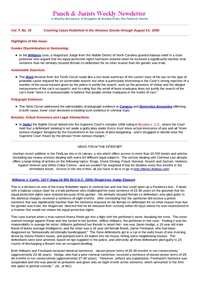Here the Ninth Circuit affirmed a district court's ruling rejecting the defendant's efforts to introduce into evidence the results of a polygraph test he had taken to prove his innocence, principally on the basis of the court's finding of prejudice.
United States v. Campos, 217 F.3d 707 (9th …
Here the Court affirmed an enhancement for"substantial interference with the administration of justice" for a defendant convicted of perjury - despite agreeing that the expenses of his perjury conviction could not form the sole basis for the enhancement.
In this case the defendant argued that the district court …
While the decision in this case may have limited application for most criminal defense attorneys, it is noted both for its detailed review of an extremely important concept in criminal law, namely the Pinkerton theory of conspiratorial liability (see Pinkerton v. U.S., 328 U.S. 640 (1946)), and for its …
In these two consolidated class action, civil rights law suits, large numbers of inmates in Arizona were forced to spend several nights outdoors, lying on the ground, handcuffed, exposed to the elements, and without food and sanitation, following prison disturbances. In one case, the court noted that "For the …
Here the Court held that the Child Online Protection Act (47 U.S.C. § 231) (COPA) was unconstitutional because it calls for Internet content to be judged on "community standards" - a ruling that was later reversed by the Supreme Court.
On October 21, 1998, Congress enacted into law …
United States v. Campos, 217 F.3d 707 (9th Cir. 2000) (Judge Thomas)
United States v. Benavidez-Benavidez, 217 F.3d 720 (9th Cir. 2000) (Judge Thomas)
Despite any changes regarding the admissibility of scientific evidence that may have been wrought by the Supreme Court’s decision in Daubert v. Merrell Dow Pharmaceuticals, …
This sentencing order arose out of the conviction of a number of police officers for their participation in and coverup of the sexual assault on Abner Louima by police officer Justin Volpe. The defendants (and principally officer Charles Schwarz who was alleged to have witnessed the actual asault on …
This case is noted for its valiant attempt to explain what the Supreme Court probably meant when it discussed the concept of "actual innocence" in Bousley v. U.S., 523 U.S. 614 (1998).
In this decision, the Eighth Circuit made a valiant attempt to explain what the Supreme Court …
This decision is noted for its strong rejection of the Government's usual arguments that it had probable cause to conduct a search of the trunk of the defendant's car after the police officer claimed to smell burnt methamphetamine.
It was the usual story. The defendant was stopped while …
Here the Court granted habeas relief to a state petitioner who argued that his equal protection rights had been violated when he received a significantly harsher total sentence than his similarly situated female co-defendant due to his gender.
This is a decision on one of the many forbidden …
Here the Seventh Circuit reaffirmed its rule (which is followed by five other Circuits) that when a drug courier is held accountable only for the drugs he carried, he is not entitled to a sentence reduction for a minor or minimal role in that offense.
In this case, …
In this case the defendant appealed the denial of his petition for a writ of habeas corpus, challenging his conviction in Oregon for rape, sodomy, and sexual abuse of a minor child. The defendant contended that his Sixth and Fourteenth Amendment rights were violated when evidence of the victim’s …
The defendant in this case was arrested on drug charges on March 22, 1995. On November 8, 1995 he filed a motion to suppress evidence, claiming that the olice had violated the "knock and announce" rule. The district court held an evidentiary hearing on the motion to suppress on …
